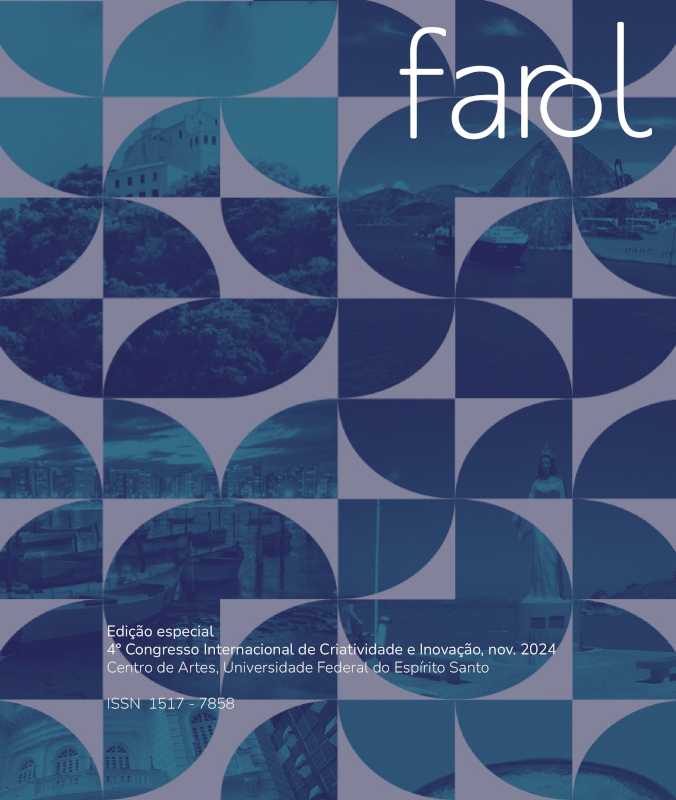Update
The Ideology of Creativity
Palavras-chave:
developmental psychology, ideology of creativity, systems theoryResumo
Ten years ago I wrote Worldmaking: Psychology and the Ideology of Creativity, tracing the ideological functions of the concept over time. The world and the psychology of creativity have changed. From developmental, sociocultural, and complex systems perspectives, how can we understand and respond to the upheavals in the political, environmental, and technological landscapes, which are emerging alongside, destabilizing social fragmentation and intensified geo-political conflict?
Referências
BATESON, G. Conscious purpose versus nature. In: Steps to an ecology of mind, (pp.). Chicago, IL, US: University of Chicago Press. 1972a. p. 432-445.
BATESON, G. Ecology and flexibility in urban civilization. In: Steps to an ecology of mind. Chicago, IL, US: University of Chicago Press. 1972b. p. 502-513.
BATESON, G., & BATESON, M. C. Angels fear: Towards an epistemology of the sacred. Cresskill, NJ, US: Hampton Press, Inc. 2005.
BOURDIEU, P. The rules of art: Genesis and structure of the literary field. EMANUEL, S. (Trans.). Stanford, CA, US: Stanford University Press. 1995.
CLAPP, E. P. Participatory creativity: Introducing access and equity to the creative classroom. New York, NY, US: Routledge. 2017.
CRAFT, A. Creativity in schools: Tensions and dilemmas. New York, NY, US: Routledge. 2005.
CRAFT, A., GARDNER, H., & CLAXTON, G. (Eds). Creativity, wisdom and trusteeship: Exploring the role of education. Thousand Oaks, CA, US: Corwin Press. 2007.
CSIKSZENTMIHALYI, M. Creativity: Flow and the psychology of discovery and innovation. New York, NY, US: HarperPerennial. 1997.
CSIKSZENTMIHALYI, M. Implications of a systems perspective for the study of creativity. In STERNBERG, R. J (Ed.). Handbook of creativity. Cambridge, UK: Cambridge University Press. 1999. p. 313–35.
FOUCAULT, M. What is an author? In: J. D. FAUBION, J. D. (Ed.), RABINOW, P. (Ser. Ed.). Essential works of Foucault 1954–1984, Volume 2. Aesthetics, method and epistemology New York, NY, US: The New Press. 1998. p. 204–22. (Original lecture in French 1969)
FREEDEN, M. Ideology: A very short introduction. Oxford, UK: Oxford University Press. 2003.
GRISANTI, M. L. Interview with Howard E. Gruber. International Journal of Group Tensions, New York, NY, US, v. 27, n. 4, p. 219–43, 1997.
GRUBER, H. E. Darwin on man: A psychological study of scientific creativity (2nd ed.). Chicago, IL, US: University of Chicago Press. 1981.
GRUBER, H. E. The evolving systems approach to creative work. In: WALLCE, D. B; GRUBER, H. E. (Eds). Creative people at work. Oxford, UK: Oxford University Press. 1989. p. 3–22.
GRUBER, H. E.; WALLACE, D. B. The case study method and evolving systems approach for understanding unique creative people at work. In: STERNBERG, R. J. (Ed.). Handbook of creativity. Cambridge, UK: Cambridge University Press. 1999. p. 93–115.
GUILFORD, J. P. Creativity. American Psychologist, Washington, DC, US, v. 5, p. 444–54, 1950.
HANCHETT HANSON, M. Worldmaking: Psychology and the ideology of creativity. New York, NY, US: Palgrave Macmillan. 2015.
HANCHETT HANSON, M. Tragedies of actualization. In: GLĂVEANU, V. P. (Ed.), The creativity reader. Oxford UK: Oxford University Press. 2019. p. 191-218.
HANCHETT HANSON, M. with EISMAN, J.; JORGE-ARTIGAU, A.; PIEDE, S.; WASENITZ, S. Creative work and distributions of power. New York, NY, US: Routledge. In press.
MANNHEIM, K. Ideology and utopia. WIRTH, L. & SHILS, E. (Trans.). New York, NY, US: Harcourt, Brace & Company. 1954. (Original work published in German 1929)
MASLOW, A. H. Motivation and personality. New York, NY, US: Harper & Row Publishers, Inc. 1970. (Original work published 1954)
MASLOW, A. H. The journals of Abraham Maslow (Abr. ed.). LOWRY, R. J. & FREEDMAN, J. (Eds). Chicago, IL, US: The Lewis Publishing Company. 1982.
MASLOW, A. H. The farther reaches of human nature. New York, NY: Penguin Books. 1993. (Original work published 1971)
MASON, J. H. The value of creativity: The origins and emergence of a modern belief. Farnham, UK: Ashgate Publishing Company. 2003.
POPE, R. Creativity: Theory, history, practice. New York, NY, US: Routledge. 2005.
RAUNIG, G.; RAY, G.; WUGGENIG, U. (Eds.). Critique of creativity: Precarity, subjectivity and resistance in the ‘creative industries’. Exeter, UK: Mayflybooks.
REHN, A. ; DE COCK, C. (2009). Deconstructing creativity. In: RICKARDS, T.; RUNCO, M. A.; MOGER, S. (Eds). The Routledge companion to creativity. New York, NY, US: Routledge. p. 222–31.
ROGERS, C. R. Client-centered therapy. New York, NY, US: Houghton Mifflin Company. 1951.
ROGERS, C. R. On becoming a person: A therapist’s view of psychotherapy. New York, NY, US: Houghton Mifflin Company. 1989. (Original work published 1961)
RUNCO, M. A.; ALBERT, R. S. Creativity research: A historical view. In:KAUFMAN, J. C.; STERNBERG, R. J. (Eds). The Cambridge handbook of creativity. Cambridge, UK: Cambridge University Press. 2010. p. 3–19.
SHELLEY, M. W. Frankenstein: The 1818 text. London, UK: Penguin Classics. 2018.
STERNBERG, R. J. Transformational creativity: The link between creativity, wisdom, and the solution of global problems. Philosophies, v. 6, n. 3, 75. 2021. https://doi.10.3390/philosophies6030075
VON GOETHE, J. W. Faust: Parts I and II. KLINE, A. S. (Trans.). Scotts Valley, CA, US: CreateSpace Independent Publishing Platform. 2015. (Original published in German in 1808)
WEINER, R. P. Creativity and beyond: Cultures, values and change. Albany: State University of New York. 2000.
WEISBERG, R. W. Creativity: Understanding innovation in problem solving, science, invention and the arts. Hoboken, NJ, US: John Wiley & Sons. 2006.
ŽIŽEK, S. The sublime object of ideology (The essential Žižek) (2nd edn.). London, UK: Verso. 2009. (Original published 1989).
Downloads
Publicado
Edição
Seção
Licença
Copyright (c) 2024 Michael Hanchett Hanson

Este trabalho está licenciado sob uma licença Creative Commons Attribution-NonCommercial-ShareAlike 4.0 International License.
Os autores de trabalhos submetidos à Revista Farol autorizam sua publicação em meio físico e eletrônico, unicamente para fins acadêmicos, podendo ser reproduzidos desde que citada a fonte. Os mesmos, atestam sua orignalidade, autoria e ineditismo.





